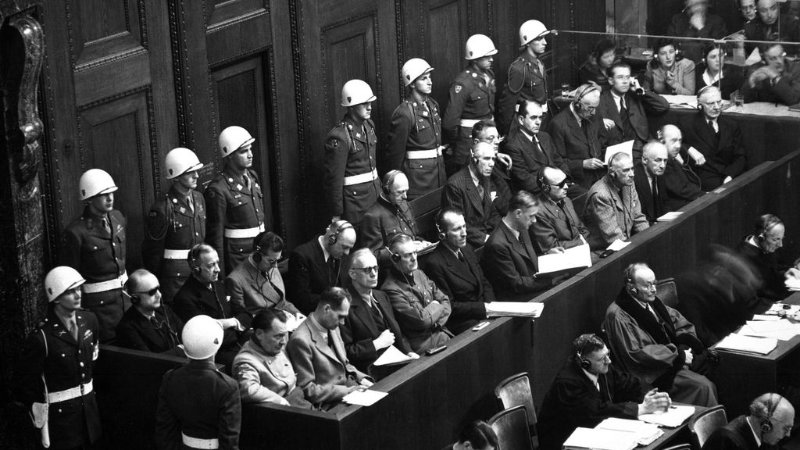Afghanistan war crimes whistleblower David McBride files special leave application to the High Court, claiming a core tenet of human rights law. Stephanie Tran reports.
In a last bid for justice, David McBride’s legal team has filed a special leave application to the High Court, arguing that Australia must not ignore the lessons of Nuremberg.
“Our key argument in the High Court is that there have to be some circumstances where disobeying orders is in the public interest and is the moral and legal thing to do,” said his lawyer, Eddie Lloyd.
If there’s only a duty to blindly follow orders, and there’s no circumstance in the world that could ever possibly exist to justify disobeying an order, then we’re ignoring Nuremberg.
The Nuremberg defence, formally rejected by the post-WWII Nuremberg Tribunal, held that individuals cannot escape criminal liability by claiming they were simply “following orders” when those orders violate fundamental principles of law. This doctrine became a cornerstone of modern international humanitarian law, establishing that moral agency cannot be outsourced to the chain of command.
In their special leave submission, McBride’s legal team wrote:
“There must be circumstances where a soldier can, and indeed must, disobey orders – even if those orders are authorised pursuant to military law. Military orders, including general orders, are not laws passed by Parliament or ruled upon by courts; their validity should not automatically render obedience with them an aspect of a soldier’s “official duty”. The Nuremberg Tribunal recognised that following orders is no defence to actions that violate fundamental principles of law, such as crimes against humanity. The same principle should apply under Australian law: obedience to orders cannot excuse conduct that offends a soldier’s ultimate duty of service. This is not to encourage defiance of orders as a norm — such exceptions should remain exceedingly rare — but to recognise that duty cannot be reduced to blind obedience. In the present case, the applicant sought to communicate to the public evidence of serious misconduct at the highest levels of military command. An insistence that duty is wholly defined by orders strips away the necessary safeguard against executive overreach and ignores the principle that duty is judged by law, not merely by military command.”
For McBride, a former military lawyer turned whistleblower, the issue strikes at the core of democratic accountability.
“The prosecution says I should have obeyed — no matter what the order was,” McBride said. “But look at Gaza. Look at what blind obedience produces. That excuse was rejected at Nuremberg for a reason. Following orders is not a defence when the orders are unlawful. I stood up because I had to. I’ll never apologise for choosing conscience over complicity. Right now, Israeli soldiers are ‘just following orders’ as they bomb and starve children in Gaza. And our government? Silent. Too afraid to challenge the US. Too compromised to speak with moral clarity.”
“The System” needs to change. War crimes whistleblower David McBride
Implications for Australian soldiers
“Any day now, Australian soldiers may be sent to Iran and told to follow orders under the premise that Iran is developing a nuclear weapon when that’s a lie. What’s going to happen to the ADF soldiers that get sent into war and realise that it’s not in Australia’s national interest and want to make a complaint?,” warned McBride’s lawyer.
Rex Patrick, founder of the Whistleblower Justice Fund echoed this concern, “In blowing the whistle on war crimes in Afghanistan, David McBride breached a general military order. No-one wants our soldier disobeying orders. The occasions that they should be permitted to do so must be rare. But it cannot be that all orders should be blindly obeyed. I hope the High Court will consider this issue. We need a safeguard in place to allow serious wrongdoing of the type that occurred in Afghanistan to be disclosed, despite orders that would otherwise prevent that.”
Greens Senator for NSW, David Shoebridge, criticised the prosecution and called for urgent reform. “This prosecution should never have happened, and once again we call for intervention to end the prosecution and urgently fix broken whistleblower laws that punish truth tellers,” he said. “It is dangerous for democracy if we accept that defence members should follow orders even when these betray the public interest.”
Currently serving a sentence of five years and eight months, McBride’s release is ultimately at the discretion of the Attorney-General, the same department that decided to prosecute him. His legal team has raised serious concerns about the fairness of that arrangement.
“Because it’s a complex federal crime, the Attorney General decides whether he gets parole or not,” said Lloyd. “He’s 61 now, and he might end up doing the whole 5 years and 8 months. It’s a massive conflict of interest because this is the same department of the Attorney General that decided to continue the prosecution. They wouldn’t pardon him, they wouldn’t stop the prosecution. They’re the ones that decide whether he gets parole or not — it’s very much a conflict of interest.”
The outcome of McBride’s special leave application is expected to be handed down on 9 October 2025.
“The High Court will decide whether to hear our case — that’s out of our hands now,” McBride said.
But no matter what happens, we cannot be defeated, because we stand for truth, justice, and the courage to say no.
David McBride
“I’m so deeply humbled by the support I continue to receive from everyday Australians. This fight has never just been about me — it’s about all of us, and the values we hold dear. You give me strength, and I promise: we will never give up, and we will not let you down.”
You can donate to David’s legal fund to help his case in the High Court.
Richard Marles concealed war crimes report, denying justice for David McBride
Stephanie is a journalist with a passion for uncovering stories that hold power to account. With a background in both law and journalism, she has worked at The Guardian and as a paralegal, where she assisted Crikey’s defence team in the high-profile defamation case brought by Lachlan Murdoch. Her reporting has been recognised nationally, earning her the 2021 Democracy’s Watchdogs Award for Student Investigative Reporting and a nomination for the 2021 Walkley Student Journalist of the Year Award.

